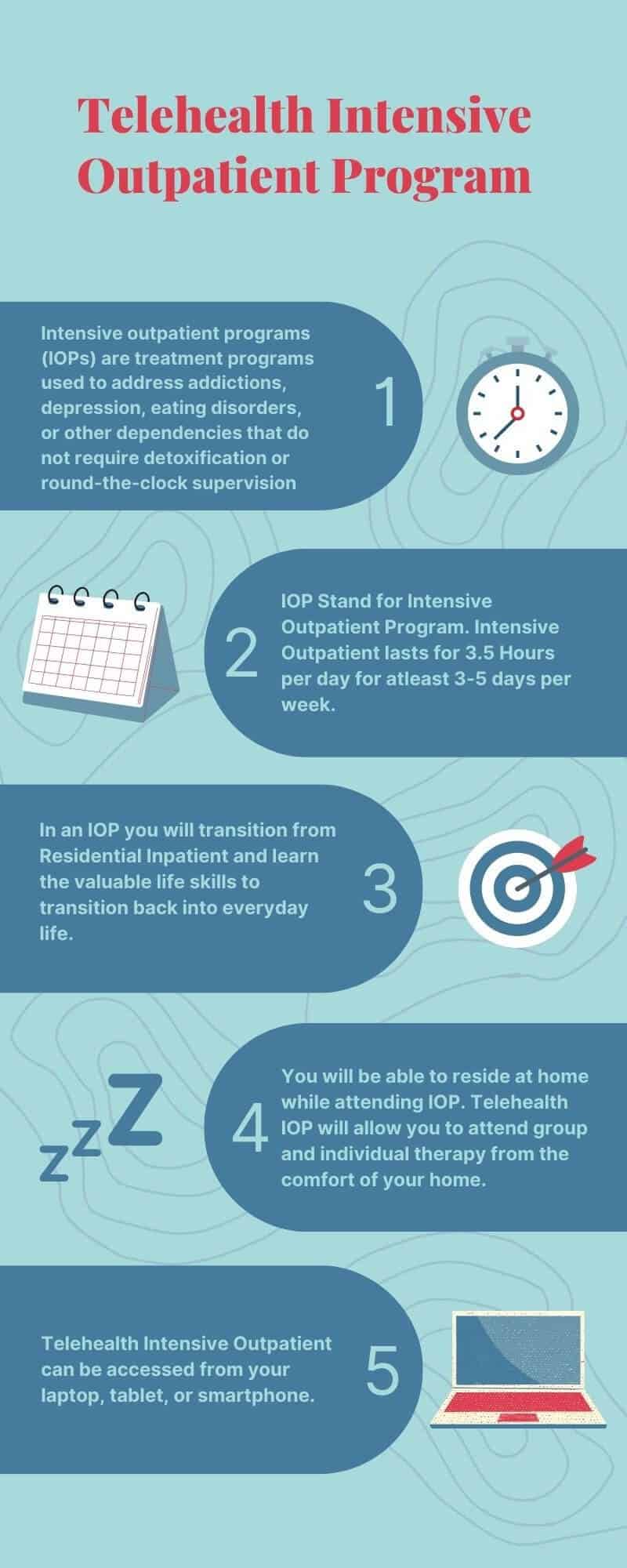Discover the Advantages of an Intensive Outpatient Program (IOP) for Recuperation
Discover the Advantages of an Intensive Outpatient Program (IOP) for Recuperation
Blog Article
Browsing the Complexities of Double Diagnosis Treatment Within an Extensive Outpatient Program Establishing
In the realm of mental wellness and addiction treatment, the intersection of double medical diagnosis offers a nuanced difficulty that demands a thorough and customized approach. Within the confines of an Extensive Outpatient Program (IOP) setting, the intricacies of attending to co-occurring psychological health and wellness disorders and substance utilize disorders call for a delicate equilibrium of expertise and sources to navigate. The combination of evidence-based methods, collective initiatives among multidisciplinary groups, and a keen understanding of the one-of-a-kind needs of each person are crucial elements in efficiently handling dual diagnosis within an IOP framework. By checking out the details of twin diagnosis therapy within this intensive outpatient context, a more clear path arises towards holistic and lasting recovery for those coming to grips with these linked difficulties.
Twin Medical Diagnosis Introduction

Understanding twin diagnosis is important as it needs a thorough and incorporated method to treatment. By recognizing the interplay between substance usage and mental health and wellness, medical care service providers can customize interventions to satisfy the special needs of each person. This alternative method not just addresses signs and symptoms however also targets hidden elements that add to the double diagnosis.
Furthermore, without treatment dual medical diagnosis can result in a cycle of relapse and aggravating mental wellness signs. By acknowledging the intricacy of twin medical diagnosis and giving specialized treatment, healthcare professionals can support individuals in achieving long-lasting healing and improved psychological wellness.
Tailored Treatment Strategies
Identifying the detailed interaction in between compound use problems and psychological health problems, the development of tailored therapy plans is vital in addressing the complexities of dual diagnosis in mental health and wellness treatment. Customized treatment strategies are customized techniques that take into consideration the unique requirements, obstacles, and goals of people encountering double diagnosis. These strategies are developed collaboratively by a multidisciplinary team of specialists, including psychiatrists, psychologists, social employees, and addiction specialists, to make certain detailed and incorporated care.
Tailored therapy strategies commonly entail a mix of treatments, drugs, and behavior treatments that target both the substance usage disorder and the mental wellness condition concurrently. These plans might include cognitive-behavioral treatment, dialectical actions treatment, medication-assisted treatment, individual counseling, team therapy, and family members therapy, to name a few evidence-based interventions. By customizing therapy methods to specific circumstances, customized strategies can deal with the root causes of double medical diagnosis, advertise long-term recuperation, and boost total lifestyle for individuals battling with co-occurring conditions.
Integrated Care Approach
An incorporated care technique in dual medical diagnosis therapy integrates medical, emotional, and social interventions to deal with the complicated demands of people with co-occurring material usage conditions and psychological wellness conditions. This method acknowledges that treating one aspect of a double diagnosis without attending to the various other can result in ineffective end results. By incorporating medical treatments such as drug administration for psychological wellness problems with emotional therapies like cognitive-behavioral therapy for material usage problems, individuals get detailed treatment that targets all aspects of their twin medical diagnosis.
By integrating social interventions like go to these guys family members treatment, trade support, and community sources, the therapy ends up being extra alternative and customized to the individual's particular demands - Intensive Outpatient Program (IOP). Generally, an integrated treatment approach in double medical diagnosis treatment within an extensive outpatient program setup aims to provide detailed, reliable, and personalized treatment to individuals facing co-occurring disorders.
Difficulties in IOP Setting
In the context of dual medical diagnosis therapy within an extensive outpatient program, navigating other the complexities of co-occurring compound use problems and mental health and wellness conditions presents significant challenges. Among the key obstacles in the IOP setup is the control of care in between psychological health professionals and chemical abuse professionals to make certain an extensive treatment approach. This requires effective communication, cooperation, and a deep understanding of how these problems engage and influence each other.

In addition, addressing preconception and resistance to therapy within the IOP setting can hamper progress. Some individuals may be reluctant to disclose their double diagnosis or might really feel embarrassed, impeding their involvement in the healing procedure. Overcoming these barriers necessitates an encouraging and non-judgmental environment that cultivates depend on and visibility.

Collaborative Specialist Initiatives
Reliable dual diagnosis treatment in an extensive outpatient program necessitates seamless collaboration among psychological wellness professionals and substance misuse specialists to make sure an extensive and incorporated approach to care. By working together, these experts can create customized treatment plans that provide to the distinct needs of each person, taking into consideration both their psychological wellness and compound abuse obstacles.
Joint efforts also encompass normal communication and details sharing amongst staff member to ensure a cohesive therapy approach. This might include case conferences, joint sessions with the client, or shared documentation to track progress and change therapy strategies as required. Furthermore, cooperation may consist of involving other health care professionals such as health care medical professionals or family members go therapists to provide holistic support to the individual. Eventually, a united front of specialists interacting improves the efficiency of twin diagnosis treatment within an extensive outpatient program.
Verdict
In verdict, reliable twin medical diagnosis treatment within an intensive outpatient program setting needs customized therapy plans and an integrated care approach. Difficulties may emerge in this setting, however collaborative efforts amongst specialists can help navigate these intricacies. By addressing the special demands of individuals with co-occurring mental health and wellness and substance use disorders, IOP programs can supply comprehensive and holistic like sustain recovery and general well-being.
Report this page